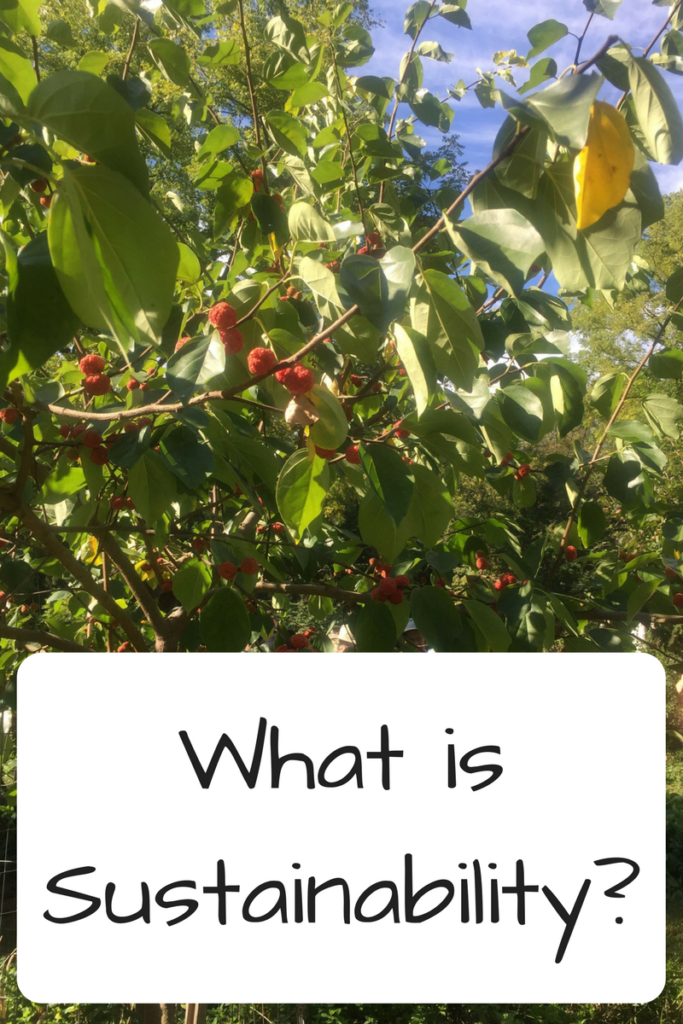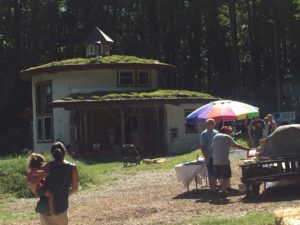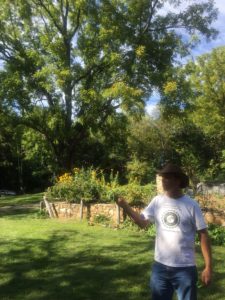
Pushing my son on the biggest tree swing I’ve ever seen, he declared, “This is fun!” As I half-listened to a talk on medicinal plants, I had to agree. We were at the second annual Paw Paw Festival at Long Creek Homestead, the home of a local family who grows much of their own food based on ecological principles. While we go to these events because they’re fun, it’s much more than that. I bring my family to these events so we can have a little glimpse into a possible potential, beautiful future. That’s because these kind of community events embody social and environmental sustainability to me.
Sustainability has become such a buzzword it’s easy to lose the true meaning. Companies sell us “green living” via labels on products that promise they will be safer for your family. (Never mind anyone else’s family.) But to create a just world that offers opportunities to all people in a way that’s environmentally sound, we have to go deeper.
What does sustainability look like?
Sustainability looks like people inviting others into their homes. A major part of the festival was tours of the family’s straw bale home. Inside it, we picked up their books, sat on their couches, were agape at the fact it was made of straw, and were maybe a little jealous of their beautifully-tiled tub. Considering we were a bunch of strangers, it was very generous.

They were demonstrating hospitality. While hospitality is an ancient concept, it’s ripe for revival. True hospitality isn’t about Instagram-worthy place settings or Julia Child-level cuisine. It’s about saying “You are welcome here.” We don’t all have to host tours, but we need to be willing to welcome different people into our schools, our neighborhoods, and our lives.
Sustainability is about how we approach our entire society, from the food we eat to the houses we live in. In addition to their straw bale house, the family grows much of their own food. It was pretty amazing to see someone actually doing it in real life.
But despite that, even this family didn’t “do it all.” For example, they lived too far away from public transit to get by without a car. It was a good reminder that even people who have composting toilets (!) aren’t “perfectly” sustainable. We all have a role to play and they’re all different.

Sustainability is about sharing our expertise with each other. Chris and I took a “food forest” tour of the property where Todd McCree of Great Escape Farms talked through many of the trees producing edible and useful products. While I’ve been reading about this area for a while, I still learned a bunch. We all have different skills to contribute, whether that’s from formal education or experience.
Perhaps most importantly, there was no eco-shaming in sight. Scolding people rarely changes behavior. It mainly serves to make you feel superior and look like a self-righteous ass.
Sustainability is local. The festival revolved around the paw-paw tree, a fruit native to America that is rarely grown commercially. Because it goes bad very fast, you can’t transport it. While I love my imported chocolate and tea, the physically closer we can be to the source of our food and essentials, the more connected we are to the production process. That helps us better understand that impact of that production on the environment and on the people involved in it.
Sustainability is about holding space for people of all backgrounds, ages, ethnicities, and walks of life. The festival was very purposefully inclusive of children. They had a huge sand pit, face painting, a dress-up tent, and a tire swing. A gaggle of kids were running around, sparkling with face paint and getting ridiculously dirty. (Little Bird’s diaper was absolutely filled with sand by the end.) Despite the permaculture community often not being very racially diverse, there were some people of color. The only criticism I would have is that because of multiple dirt roads, the event wasn’t very inclusive of people with physical disabilities.
Sustainability is about play and celebration. While the children were having a blast, the event was relaxing for adults as well. They had ice cream tastings, corn hole boards, and plenty of space to spread out blankets. Last year, they had a couple of musicians. No matter how important hard work towards sustainability is, so is taking a break.
At its core, sustainability is about community. It’s about people living and respecting each other and the natural life around them. If I can teach my kids this by word and deed, then I’ve passed on some valuable life lessons indeed.
Teaching my children how to live in community, both social and natural, is a big part of my parenting. For thoughts on parenting as someone passionate about sustainability, check out A Call to Action for Parents on Climate Change. For finding some online community, be sure to join our Green and Sustainable Parenting group on Facebook!